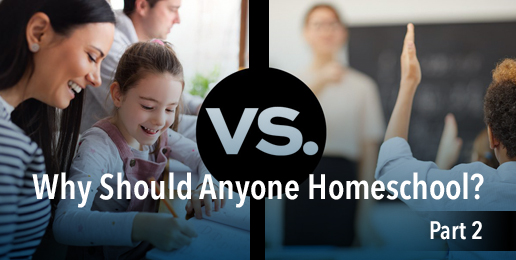
In a recent piece together, we explored one of the major benefits of homeschooling that greatly impacted me as a student: the freedom that my parents had to tailor my education to my needs. I know many other homeschool families have reaped this benefit from homeschooling as well.

Homeschooling parents are able to educate their children according to their individual needs and aptitudes, which often results in a more rigorous and productive education than the standard fare in the public school system.
However, I ended the piece by remarking that this is not the most important reason to homeschool. I say this as a K-12 homeschooler, but I’m not the only one saying this. Prominent homeschool researcher Brian Ray gave a talk a few years ago in which he explained the data showing the superior education homeschooling often provides, but then clarified:
“You don’t home educate to get high test scores.”
Wait a minute. If you shouldn’t homeschool just for the educational benefits, then what’s the deeper reason?
The most fundamental reason I’m glad my parents homeschooled me has to do more with the educational environment than the educational quality. Because my parents educated me at home, I was raised in an environment where Christ was Lord. As Dr. Ray put it,
“You home educate because you believe it’s biblically normative and/or commanded.”
Jesus tells us that every student, when he is trained fully, will be like his master (Luke 6:40). Dr. Ray makes a big deal about this in the aforementioned talk, and for good reason. The kind of education provided at public schools nowadays removes God from the process of learning about His world and replaces Him with destructive philosophies and sexualized educational fads. (See here, here, and here for three recent IFI articles addressing the current state of our schools.)
Now, there is a way to be too extremely protectionist about your kids, isolating them from every whiff of cultural rot such that they graduate and leap into the world without a clue as to what’s facing them. They’ll need to know what the world is saying before they enter the world on their own.
But if parents use this as a justification for sending their kids to public school, they might not be considering the difference between exposure and immersion.
Many children—especially at the vulnerable, impressionable age they are—will not be able to stand pure against the constant, persistent influence of a godless worldview. Even if they hear otherwise at home, their thinking will start to become clouded with what they hear for hours a day at school. And the few remarkable ones who are grounded in their faith at an early age might very well have to spend much of their energy throwing away, discarding, refuting, and unlearning various things they’re being taught—which is hardly the ideal educational situation.
I’ll freely admit that “being in the world, but not of the world” is always subject to discernment. And soldiers need to make contact with the enemy in order to be effective. But soldiers usually only start fighting after a certain amount of solid training. Christian parents must think about what degree of resilience their children have before immersing them in the battlefield in their impressionable state.
Several years ago, I once asked my dad about a certain subject that was too mature for me to know about at the time. When he refused to explain it to me, I asked him why.
“Well,” he said, “think about what happens when you drive a car into a tree.”
“The car will get smashed,” I said.
“That’s right—if the tree has already grown up. If it’s still a small sapling and still needs two-by-fours to hold it up, the car will do more damage to the tree than the tree will do to the car.”
And—as someone who was once a child—I believe children work the same way. We don’t generally use saplings for guardrails or send seven-year-olds into the thick of battle.
We’ll wrap this up in part 3, where we’ll finish this thread and include a few qualifications. Ultimately, we’ll see that while there may be a few exceptions here and there, the overwhelming choice for Christian families should be to bring up their children in an environment where Christ is Lord. I fully admit that homeschooling is not the only way to do this.
But it definitely is a good way to do this, and my hope is that this series helps explain some of the strong reasons why, and the benefits I’ve experienced personally.
Stay tuned!























